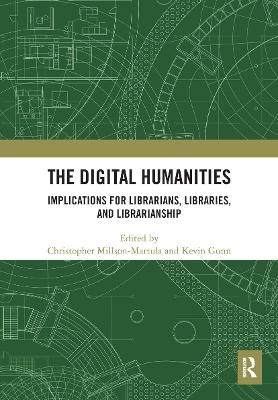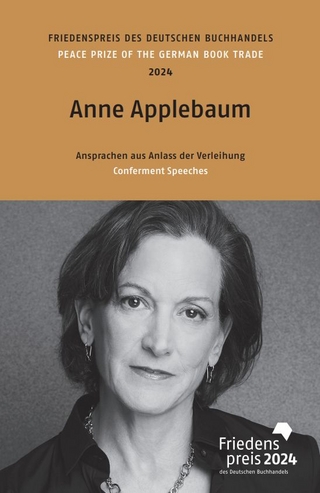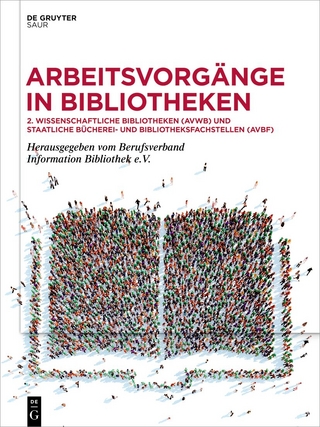
The Digital Humanities
Routledge (Verlag)
978-0-367-66354-4 (ISBN)
- Titel z.Zt. nicht lieferbar
- Versandkostenfrei innerhalb Deutschlands
- Auch auf Rechnung
- Verfügbarkeit in der Filiale vor Ort prüfen
- Artikel merken
The digital humanities in academic institutions, and libraries in particular, have exploded in recent years. Librarians are constantly developing their management and technological skills and increasing their knowledge base. As they continue to embed themselves in the scholarly conversations on campus, the challenges facing subject/liaison librarians, technical service librarians, and library administrators are many.
This comprehensive volume highlights the wide variety of theoretical issues discussed, initiatives pursued, and projects implemented by academic librarians. Many of the chapters deal with digital humanities pedagogy—planning and conducting training workshops, institutes, semester-long courses, embedded librarian instruction, and instructional assessment—with some chapters focusing specifically on applications of the “ACRL Framework for Information Literacy for Higher Education.” The authors also explore a wide variety of other topics, including the emotional labor of librarians; the challenges of transforming static traditional collections into dynamic, user-centered, digital projects; conceptualizing and creating models of collaboration; digital publishing; and developing and planning projects including improving one’s own project management skills. This collection effectively illustrates how librarians are enabling themselves through active research partnerships in an ever-changing scholarly environment.
This book was originally published as a special triple issue of the journal College & Undergraduate Libraries.
Christopher Millson-Martula retired in 2017 as Director of the Library at Lynchburg College, USA after a lengthy career in college and university libraries. His areas of particular interest included customer service, collection management, and interlibrary cooperation. He was active in the profession at local, regional, state, and national levels, including as Chairperson of the College Libraries Section at the Association of College and Research Libraries, Chicago, USA. In addition, he has published extensively in journal literature, made numerous conference presentations, and served as former Editor of the journal College & Undergraduate Libraries. Kevin Gunn is Coordinator of Digital Scholarship at The Catholic University of America Libraries, Washington, D.C., USA. He teaches courses in humanities research and digital humanities in the Department of Library and Information Science at the same university. Kevin is Editor of the journal College & Undergraduate Libraries. His interests include presenting and publishing on issues in information ethics, predatory publishing, digital scholarship, and professional development for librarians.
1. Introduction: The digital humanities: Implications for librarians, libraries, and librarianship Part I: Theoretical and Critical Perspectives 2. Evaluating the landscape of digital humanities librarianship 3. Claiming expertise from betwixt and between: Digital humanities librarians, emotional labor, and genre theory Part II: Transforming Material Collections 4. The Rosarium Project: A case of merging traditional reference librarian skills with digital humanities technology 5. Subject librarian as coauthor: A case study with recommendations 6. Experiencing medieval manuscripts using touch technology 7. Creating digital knowledge: Library as open access digital publisher Part III: Models of Collaboration 8. Developing collaborative best practices for digital humanities data collection: A case study 9. Digital humanities and the emerging framework for digital curation 10. Against the grain: Reading for the challenges of collaborative digital humanities pedagogy Part IV: Planning and Project Management 11. They think all of this is new: Leveraging librarians’ project management skills for the digital humanities 12. "A community of common descent": Planning the documentation of diaspora through the Electronic Irish Research Experience 13. Project management for digital projects with collaborators beyond the library 14. Community-Enhanced Repository for Engaged Scholarship: A case study on supporting digital humanities research 15. Building an ethical digital humanities community: Librarian, faculty, and student collaboration 16. So what are you going to do with that?: The promises and pitfalls of massive data sets 17. Digitizing more for less: Digital preservation at The College of New Jersey Part V: ACRL Framework for Information Literacy for Higher Education 18. Spatial information literacy for digital humanities: The case study of leveraging geospatial information for African American history education 19. Visualizing oral histories: A lab model using multimedia DH to incorporate ACRL framework standards into liberal arts education 20. Conversation as a model to build the relationship among libraries, digital humanities, and campus leadership 21. From service to synergy: Embedding librarians in a digital humanities project Part VI: Embedded Librarian Instruction 22. Shifting expectations: Revisiting core concepts of academic librarianship in undergraduate classes with a digital humanities focus 23. Teaching TEI to undergraduates: A case study in a digital humanities curriculum 24. Faculty–library collaborations in digital history: A case study of the travel journal of Cornelius B. Gold 25. A subject librarian’s pedagogical path in the digital humanities 26. Beyond the one-shot: Intensive workshops as a platform for engaging the library in digital humanities 27. The Digital Humanities Summer Scholarship: A model for library-led undergraduate digital scholarship 28. Practitioners as professors: Experiential learning in the distance digital liberal arts classroom 29. GIS and the humanities: Presenting a path to digital scholarship with the Story Map app 30. Reading in the digital age: A case study in faculty and librarian collaboration 31. Process and collaboration: Assessing digital humanities work through an embedded lens
| Erscheinungsdatum | 01.10.2020 |
|---|---|
| Verlagsort | London |
| Sprache | englisch |
| Maße | 174 x 246 mm |
| Gewicht | 940 g |
| Themenwelt | Sozialwissenschaften ► Kommunikation / Medien ► Buchhandel / Bibliothekswesen |
| ISBN-10 | 0-367-66354-6 / 0367663546 |
| ISBN-13 | 978-0-367-66354-4 / 9780367663544 |
| Zustand | Neuware |
| Haben Sie eine Frage zum Produkt? |
aus dem Bereich


